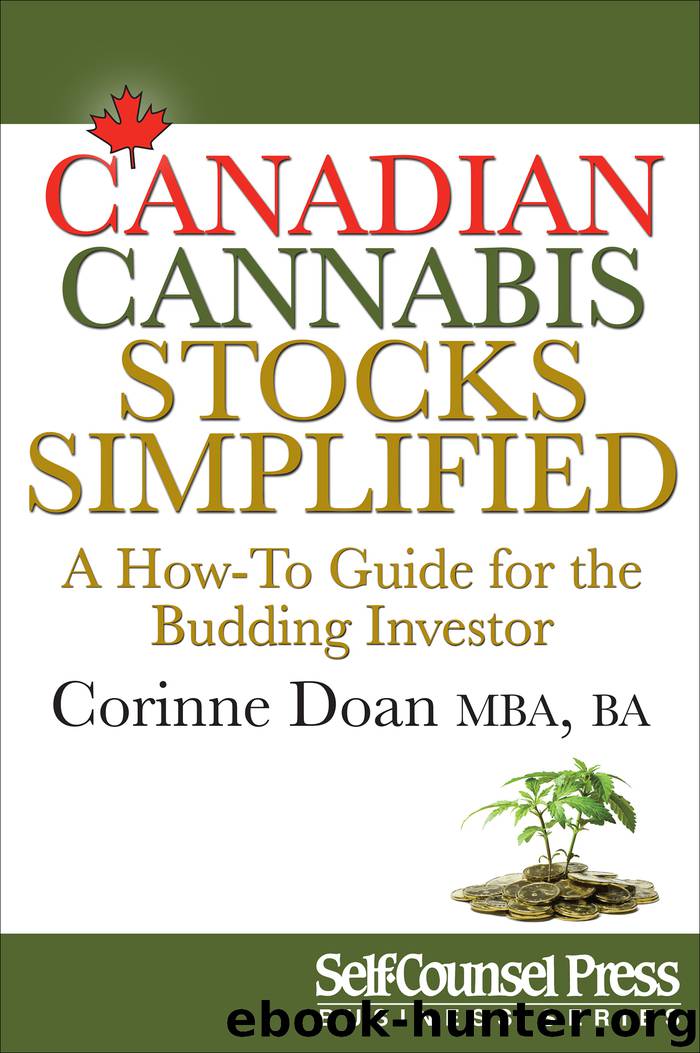Canadian Cannabis Stocks Simplified by Corinne Doan

Author:Corinne Doan [Corinne Doan]
Language: eng
Format: epub
Tags: BUSINESS & ECONOMICS / Personal Finance / Investing, BUSINESS & ECONOMICS / Investments & Securities / Stocks
Publisher: Self-Counsel Press
Published: 2018-08-31T16:00:00+00:00
3.1 A comparative analysis of LPs’ shares outstanding
Market capitalization (CAP) is a popular term, and for me as an experienced investor, it means very little. Market cap is the total market value of the securities of a company. It is calculated by taking the number of issued and outstanding securities, multiplied by the last trading price or closing bid.
A true market cap incorporates more than the shares outstanding. An issuer may have issued securities and then repurchased those securities without cancelling them. In that case, the securities are issued but are not outstanding. As a result, the number of issued securities does not equal the number of outstanding securities. This inflates and dilutes the numbers if you are trying to determine if a company has a low or high trading volume. Another reason I don’t use market caps is because two companies can have similar market caps but completely different trading prices or securities outstanding. For example, Company ABC has 1 million shares outstanding and is trading at a price of $5 for a market cap of $5 million. Company XYZ has 5 million shares outstanding with a stock price trading at $1 for the same market cap of $5 million. It can be relevant if trying to assess the market share of an industry. However, this doesn’t help while trying to assess if the company is trading higher than normal volumes. For assessing stock prices and trading volumes, I prefer to look at the shares outstanding. I believe it gives a purer reflection of the numbers in the market.
If you are trying to determine the volume of shares trading in a day is low or high, it is helpful to know how many shares are available to trade. The shares outstanding are also a good reflection of the supply and demand rules of economics. The less the supply, the greater the demand. If too many shares are outstanding, the stock price will be diluted and it will take more momentum to see price movements and influxes. If too few shares are outstanding, prices will fluctuate and have rapid volatility. There needs to be a sufficient balance of shares outstanding to accommodate a liquid market.
To simplify, let’s compare playing with cards. While playing card games, there is a greater predictability of the possibilities when only one deck is used. When more decks are added to the game, it becomes more difficult to predict what you may get hit with. Same logic applies to shares outstanding. There is a greater predictability of what might happen when there are fewer shares outstanding.
Shares outstanding is also a quick indication for how many times the company has had go to the table to ask for money. When a company raises capital on the stock market, they offer more outstanding shares. It dilutes the stock each time there is a financing. If there are a larger than normal amount of shares outstanding, it can be an indication of poor management. Of course, there are exceptions to this rule.
Download
This site does not store any files on its server. We only index and link to content provided by other sites. Please contact the content providers to delete copyright contents if any and email us, we'll remove relevant links or contents immediately.
Rich Dad Poor Dad by Robert T. Kiyosaki(6637)
Pioneering Portfolio Management by David F. Swensen(6302)
How To Win Friends and Influence People by Dale Carnegie(4513)
The Money Culture by Michael Lewis(4209)
The Dhandho Investor by Mohnish Pabrai(3767)
The Wisdom of Finance by Mihir Desai(3749)
Liar's Poker by Michael Lewis(3450)
Fooled by Randomness: The Hidden Role of Chance in Life and in the Markets by Nassim Nicholas Taleb(3124)
The ONE Thing by Gary Keller(3072)
Mastering Bitcoin: Programming the Open Blockchain by Andreas M. Antonopoulos(3046)
The Intelligent Investor by Benjamin Graham Jason Zweig(3043)
The Psychology of Money by Morgan Housel(3037)
Rich Dad Poor Dad: What The Rich Teach Their Kids About Money - That The Poor And Middle Class Do Not! by Robert T. Kiyosaki(2958)
Investing For Dummies by Eric Tyson(2955)
How to Day Trade for a Living: Tools, Tactics, Money Management, Discipline and Trading Psychology by Andrew Aziz(2949)
How to Win Friends and Influence People by Dale Carnegie(2918)
Market Wizards by Jack D. Schwager(2702)
How to Pay Zero Taxes, 2018 by Jeff A. Schnepper(2655)
Zero Hour by Harry S. Dent Jr. & Andrew Pancholi(2649)
